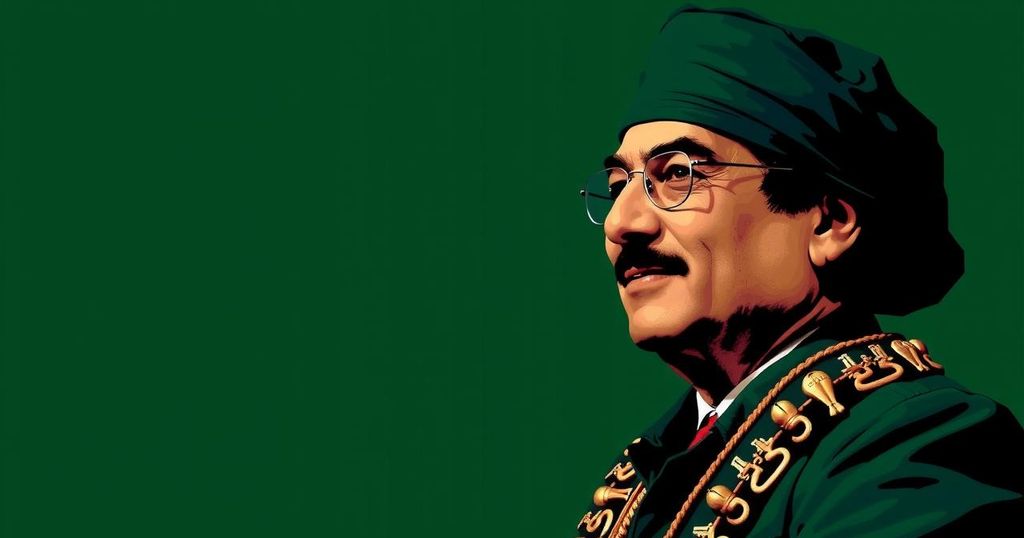Muammar al-Qaddafi: A Transformative yet Controversial Leader of Libya
Muammar al-Qaddafi was Libya’s de facto leader from 1969 until his death in 2011. Born to a Bedouin family, he rose through military ranks to overthrow King Idris I. His rule was marked by attempts at Arab unification, the nationalization of resources, and erratic foreign relations. During the Arab Spring, significant protests led to a violent crackdown and Qaddafi’s eventual death at the hands of rebel forces, ending over four decades of authoritarian rule.
Muammar al-Qaddafi (1942–2011) was the leader of Libya from 1969 until his ousting during the 2011 revolt. He was born in a tent in the Libyan desert, the son of a Bedouin farmer, and showed academic promise, graduating from the University of Libya in 1963. A fervent Arab nationalist and devout Muslim, Qaddafi orchestrated a coup against King Idris I on September 1, 1969. Upon assuming power, Qaddafi removed foreign military bases, expelled Italian and Jewish communities, and nationalized the oil sector, implementing a strict Islamic code that prohibited alcohol and gambling. He endeavored to unify Libya with other Arab states but maintained a staunch opposition to Israel and was involved in military interventions in Chad. In 1974, Qaddafi introduced a form of Islamic socialism in his manifesto, The Green Book, emphasizing nationalization and populist governance. Though he stepped down from formal leadership in 1979, he continued to wield significant power as Libya’s effective ruler. On the global stage, Qaddafi’s leadership was marked by erratic behavior and support for various revolutionary movements, including the Black Panthers in the U.S. This involvement led to international conflict, highlighted by the U.S. bombing of Libyan sites in 1986 and the later sanctions following the Lockerbie bombing in 1988. In the early 21st century, Qaddafi attempted to rehabilitate his regime, culminating in his role as chairman of the African Union in 2009. However, the Arab Spring ignited a wave of protests in 2011, leading to violent crackdowns by his regime. Despite attempts to quell the uprising through force, Qaddafi’s hold on power weakened, prompting international intervention. By August 2011, rebel forces overcame Qaddafi’s defenses in Tripoli, capturing his stronghold. Following several months of conflict, Qaddafi was ultimately killed on October 20, 2011, as rebel forces gained control of Sirte, marking the end of his over four-decade rule in Libya.
Muammar al-Qaddafi’s legacy is one of significant influence and controversy in Libya and the broader Arab world. His rise to power represented a pivotal change in Libyan governance, shifting from monarchy to a self-proclaimed revolutionary state. Qaddafi’s policies reflected a blend of nationalist and socialist ideologies, as he sought to align Libya with broader Arab interests while maintaining a centralized grip on power. His international relations were fraught with tension and conflict, particularly in the West, which viewed his regime with suspicion due to its support for insurgent groups and involvement in acts of terrorism. The eventual uprising against his rule, amidst the backdrop of the Arab Spring, illustrated the widespread discontent with his authoritarian regime and the desire for democratic reform among the Libyan populace.
The life and leadership of Muammar al-Qaddafi were marked by profound transformations in Libya, characterized by a shift from monarchy to a controversial revolutionary regime. His policies, while initially promising in terms of national empowerment, ultimately led to economic challenges and international isolation. The culmination of his rule, besieged by civil unrest and foreign intervention, underscores the complex dynamics of power, governance, and popular resistance within a nation seeking change.
Original Source: www.britannica.com




Post Comment